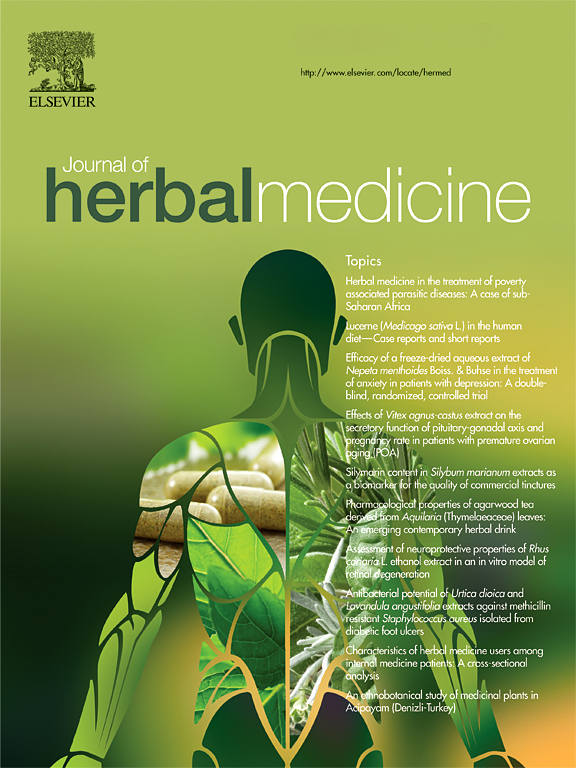Oral Chinese Herbal Medicine for Chemotherapy-Induced Peripheral Neuropathy: Systematic Review and Meta-analysis
IF 1.9
4区 医学
Q2 INTEGRATIVE & COMPLEMENTARY MEDICINE
引用次数: 0
Abstract
Introduction
It is estimated that about 30% of patients who received chemotherapy will develop chemotherapy-induced peripheral neuropathy (CIPN). Chinese herbal medicine is widely used to treat CIPN in China, but its efficacy has not been investigated. Our study aims to review the current literature on the effectiveness of oral herbal medicine in controlling the symptoms of CIPN.
Methods
Up until July 2024, relevant international databases were searched. Chemotherapy-induced peripheral neuropathy treated with oral Chinese herbal medicine in randomised controlled trials was included. The effective rate of the improving grade of peripheral nerve injury, nerve conduction velocity, Karnofsky performance score (KPS), and traditional Chinese medicine (TCM) syndrome efficiency were the outcomes; the increase in ALT, AST, and the incidence of vomiting were used as safety indicators.
Results
This review included 14 articles. The overall effect of oral Chinese herbal medicine on CIPN is statistically significant, suggesting that herbal medicine can benefit patients suffering from CIPN. The intervention group shows significant differences in the effective rate of improving the grade of peripheral nerve injury (P<0.05), sensory nerve conduction velocity (P ≤ 0.05), KPSs (P<0.05), and the TCM syndrome efficiency (P<0.05) when compared with the control groups. However, the motor nerve conduction velocity (P>0.05) shows no statistically significant difference.
Conclusions
Oral Chinese herbal medicine is an effective method to relieve CIPN symptoms and can increase the effective rate of improving the grade of peripheral nerve injury, sensory nerve conduction velocity, KPSs, and TCM syndrome efficiency, and it has a good security.
Prospero
CRD42023493091.
口服中草药治疗化疗引起的周围神经病变:系统评价和荟萃分析
据估计,约30%接受化疗的患者会发生化疗诱导的周围神经病变(CIPN)。中草药在中国被广泛用于治疗CIPN,但其疗效尚未得到研究。我们的研究旨在回顾目前关于口服草药控制CIPN症状的有效性的文献。方法检索至2024年7月的国际相关数据库。随机对照试验纳入口服中草药治疗化疗诱导的周围神经病变。观察周围神经损伤改善程度的有效率、神经传导速度、Karnofsky表现评分(KPS)、中医证候疗效;以ALT、AST升高和呕吐发生率作为安全性指标。结果本综述纳入14篇文献。口服中草药对CIPN的总体影响具有统计学意义,提示中草药对CIPN患者有益。干预组在改善周围神经损伤程度的有效率(P<0.05)、感觉神经传导速度(P ≤ 0.05)、kpi (P<0.05)、中医证候疗效(P<0.05)等方面与对照组比较均有显著差异。而运动神经传导速度差异无统计学意义(P < 0.05)。结论口服中草药是缓解CIPN症状的有效方法,可提高周围神经损伤程度、感觉神经传导速度、kps和中医证候疗效的有效率,且具有较好的安全性。
本文章由计算机程序翻译,如有差异,请以英文原文为准。
求助全文
约1分钟内获得全文
求助全文
来源期刊

Journal of Herbal Medicine
INTEGRATIVE & COMPLEMENTARY MEDICINE-
CiteScore
3.90
自引率
0.00%
发文量
94
期刊介绍:
The Journal of Herbal Medicine, the official journal of the National Institute of Medical Herbalists, is a peer reviewed journal which aims to serve its readers as an authoritative resource on the profession and practice of herbal medicine. The content areas of the journal reflect the interests of Medical Herbalists and other health professionals interested in the clinical and professional application of botanical medicines. The objective is to strengthen the research and educational base of herbal medicine with research papers in the form of case studies, original research articles and reviews, monographs, clinical trials and relevant in vitro studies. It also publishes policy statements, opinion pieces, book reviews, conference proceedings and profession related information such as pharmacovigilance reports providing an information source for not only the Herbal Practitioner but any Health professional with an interest in phytotherapy.
 求助内容:
求助内容: 应助结果提醒方式:
应助结果提醒方式:


